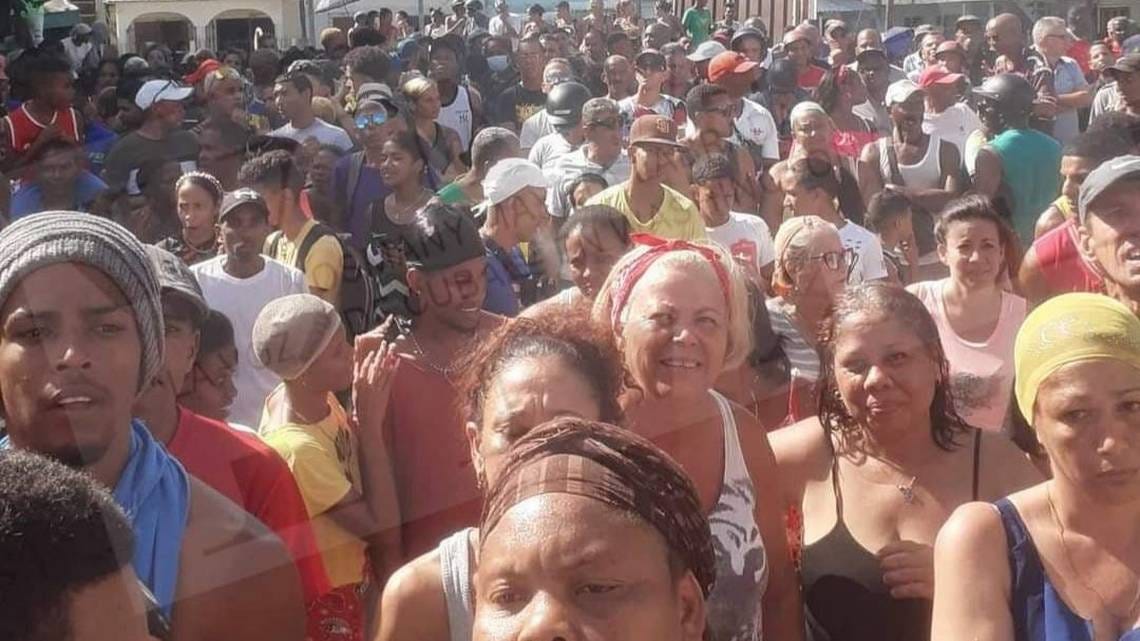Hundreds of Cubans protested in Santiago de Cuba, outraged by ongoing power outages and food shortages. People at the rally changed “power and food,” according to videos posted on social media. (Reuters, Associated Press)
Cuban outlet 14 y Medio reports that thousands of people participated in demonstrations, and that the Cuban government responded — as it has in the past — by blocking communications and cutting internet access from phones.
Activist Yasmany Labrada, a former Santiago dissident who currently lives in Washington, D.C., published other videos of the protest, where Santiago residents can be heard chanting “we are hungry” and the presence of military forces at the scene, reports the Miami Herald.
Although there have been other demonstrations of discontent in recent times, it was the largest protest that has taken place since those of July 2021, reports El País.
State media confirmed the protests in Santiago, while the U.S. Embassy in Havana said there were also reports of protests in a number of other provinces across the island. Cuban President Miguel Díaz-Canel also referred to protests in a social media post, though he did not specify where they occurred.
Official confirmation of the protests is unusual, according to the Miami Herald, “suggesting the government wants to avoid the sort of international backlash that followed the violent crackdown on protesters during the island-wide July 11, 2021, demonstrations.”
Waves of blackouts have grown worse in recent weeks, adding to frustrations over food shortages and inflation that have made it increasingly difficult to live in Cuba.
Bolsonaro implicated in coup plan
Former Brazilian president Jair Bolsonaro presented top military officials with a plan to carry out a coup after voters rejected his reelection bid in October 2022, according to testimony from two former commanders in newly released judicial documents. The two military officials said Bolsonaro presented them with supposedly legal means to annul the elections, in December of that year.
Both the officials — the president’s Army and Air Force commanders at the time — refused and warned Bolsonaro they would arrest him if he tried it, according to judicial documents released Friday. (Associated Press)
“Their statements further complicate Bolsonaro’s legal situation as they put the far-right populist at the centre of the alleged conspiracy to keep him in power,” reports the Guardian.
Bolsonaro said on Saturday that he does not fear being put on trial, but did not refer directly to the allegations in the recently released testimony, reports Reuters.
More Brazil
Brazilian President Luiz Inácio Lula da Silva’s efforts to clamp down on illegal mining in the Amazon are failing, after initial successes. Some critics say it is because cash-strapped environmental agencies handed operations over to the armed forces, reports the Christian Science Monitor.
Colombia
Colombian President Gustavo Petro suspended a ceasefire with the FARC dissident group the EMC, after Indigenous leaders said a Saturday attack in Cauca wounded at least three people and that a young student was taken away by force. (Associated Press)
Petro suggested a constitutional reform in a speech on Friday. A Legislative Assembly could be a solution to the legislative gridlock that has mired much of Petro’s reform agenda, reports El País.
Haiti
Haiti’s healthcare system has all but collapsed in the midst of ongoing gang warfare that has brought the country’s beleaguered government to its knee, leaving violence victims with little hope of medical attention, reports the Guardian.
“More than half of the medical facilities in Port-au-Prince and a large rural region called Artibonite are closed or not operating at full capacity, experts said, because they are too dangerous to reach or their medicine and other supplies have been stolen,” reports the New York Times.
Readers of the Daily Briefing are well-versed in the day-to-day evolution of Haiti’s ongoing crisis — but, in case you need a refresher, I wrote an explainer for Cenital.
“The history of Haiti is one in which the nation’s governing classes have exhibited a contempt for the masses extraordinary even by the standards of the global south,” writes Kenan Malik in the Guardian. “It is also one in which foreign powers have never shrunk from repression and bloodshed, or straightforward theft, in pursuit of their aims, sometimes in alliance with local elites, sometimes in opposition to them.”
Venezuela
Venezuelan President Nicolás Maduro formally became his party’s nominee for the July 28 presidential election, on Saturday. Government repression of critics and judicial bans on opposition leaders mean Maduro will likely face little challenge in obtaining a third mandate in a process tarnished by systematic irregularities. (Associated Press)
Opposition leader María Corina Machado, who is barred from running, is facing increasing pressure to make space for a substitute to challenge Maduro, reports the Associated Press separately.
Ahead of the March 25 deadline for registration, Machado said on social media yesterday that she make the “correct decision.” (Associated Press)
Migration
U.S. asylum interviews have sped up, but “the failed border bill means authorities still lack resources to handle most new migrants,” reports the Washington Post.
A Baker Institute brief explores Mexico and Brazil’s refugee/migrant relocation programs, noting, “The fact that these innovative, and largely successful, relocation programs are being implemented by two refugee-hosting countries in the Global South is noteworthy and shows that local integration for refugees remains a viable and durable solution… By finding solutions that not only enhance refugee protection and well-being but also cater to domestic labor needs, these initiatives promote a mutually beneficial scenario.” — Via Americas Migration Brief
Chile
Chile’s prolonged drought hampered efforts to douse what became the country’s deadliest wildfire in February, killing 134 people and destroying thousands of homes, reports the New York Times.
Argentina
Argentine President Javier Milei’s “anarcho-capitalism” ideology “combines the total economic freedom of a tax haven like the Cayman Islands with the total political subordination of Guantánamo,” writes Ernesto Semán in the New York Review of Books.
Argentina’s monthly inflation rate is currently the highest in the world — a central challenge for Milei’s “libertarian approach to problem-solving,” writes Marcelo García in the Buenos Aires Times. While the government has controlled exchange rate volatility, the effect has been inflation in dollars that puts basic food products increasingly out of reach.
“Milei’s anti-abortion rhetoric has prompted growing numbers of doctors in Argentina to refuse to carry out terminations,” reports the Guardian, citing medical professionals across the country who are bracing for an increase in clandestine procedures.
Histories
Efforts to conserve the Spanish colonial era San José galleon, discovered off the coast of Colombia in 2015 — and recover its precious cargo of gold, silver and emeralds — have been caught up in a complicated string of international legal disputes, with Colombia, Spain, Bolivian indigenous groups and a US salvage company laying claim, reports the Guardian.






